Saludos Querida Comunidad.
Introducción
Después de unos meses de ausencia por una dolencia causada por una lesión en la zona del manguito rotador, quiero compartir con ustedes cómo ha sido este proceso de rehabilitación y cómo he aprendido más sobre esta maravillosa máquina que llamamos cuerpo.
Comprendí la importancia de conocer cuáles son los mecanismos que tiene nuestro cuerpo, especialmente nuestros músculos, ligamentos y tendones en caso de lesión.
Cuáles son los cuidados que debemos tener para evitar lesiones, posturas, movimientos, cómo debemos ejecutarlos correctamente para evitar daños.
Después de practicar senderismo utilizando un bastón para avanzar en el camino, debido al mal uso y abuso de ese bastón, me produjo una fuerte inflamación en la zona del manguito rotador.
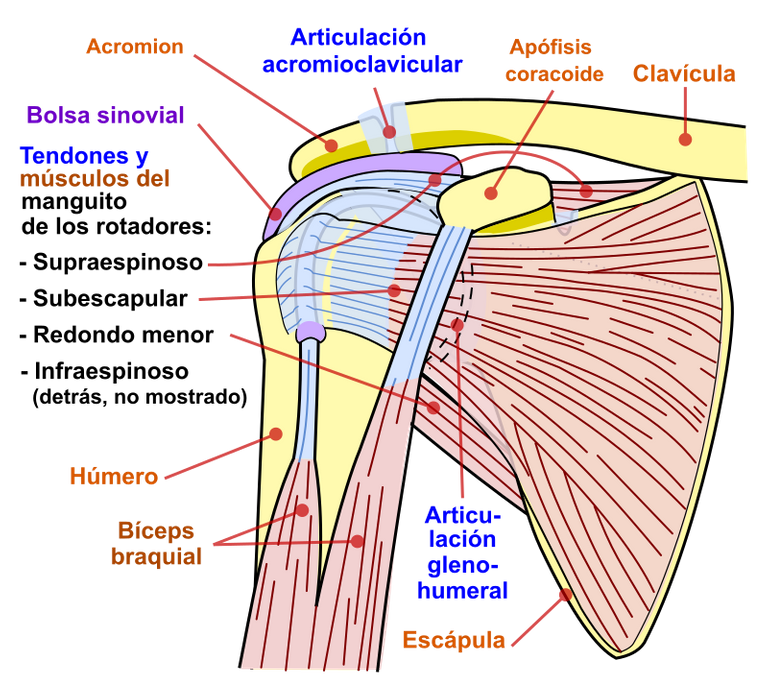
El Manguito Rotador-Tratamiento
El manguito rotador está formado por varios músculos y tendones como el Supraespinoso, Subescapular, Redondo menor e Infraespinoso.
Este conjunto de músculos hace posible todos los movimientos que hacemos con nuestros brazos, rotaciones, elevaciones, flexiones, con esta experiencia entendí que nuestro cuerpo siempre nos protegerá como mecanismo de defensa, el dolor y la inflamación para evitar el movimiento.
Es muy importante conocer las medidas a tomar en estos casos para evitar que se prolongue el dolor y la inflamación, en mi caso no presté mucha atención, y aunque puse frío y calor para desinflamar no fue suficiente ni la forma más adecuada para ayudar a la recuperación de esta zona.
Es por ello que busqué la ayuda de especialistas en la materia como es el caso de mis amigos Daiana Jugo y Néstor López, excelentes fisioterapeutas con más de 20 años de experiencia, y que ofrecen sus servicios en la ciudad donde vivo actualmente Barinas, Venezuela.
Compartiré con ustedes los equipos, tecnología y dispositivos que se utilizan actualmente en este centro de rehabilitación y que realmente han sido de gran ayuda y que he podido ver los avances y mejoras en esta área afectada.
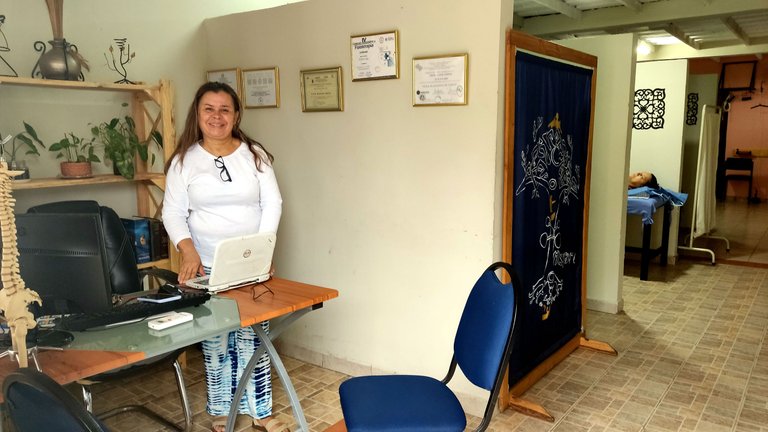
Mi amiga Daiana es un ser maravilloso, dulce y cariñoso, que hace de las terapias un momento en el que puedes trascender el dolor y convertirlo en dulzura.
Este tipo de lesiones requiere paciencia y perseverancia para ir recuperando el tono natural y la movilidad de la zona afectada. Es muy importante el acompañamiento de un buen fisioterapeuta que maneje tanto los aspectos físicos como los emocionales para lograr el objetivo.
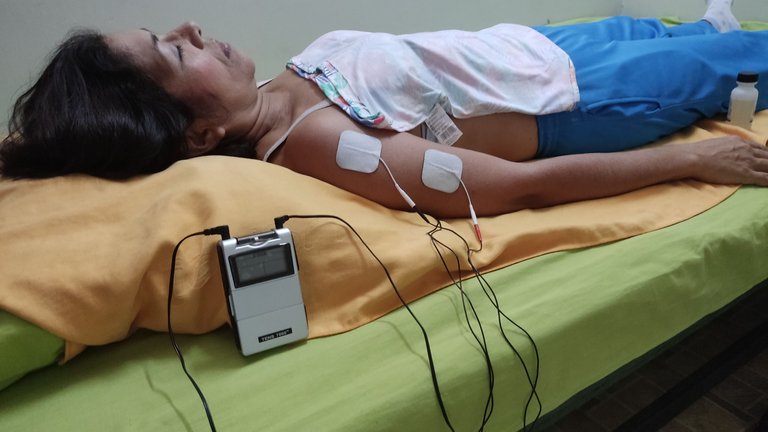
Electroterapia
Comenzamos las sesiones con electroterapia, que según me explicó el fisioterapeuta tiene básicamente tres tipos de usos. Como analgésico, para el fortalecimiento muscular y para mejorar la circulación. Para cada función se utiliza un tipo de onda diferente.
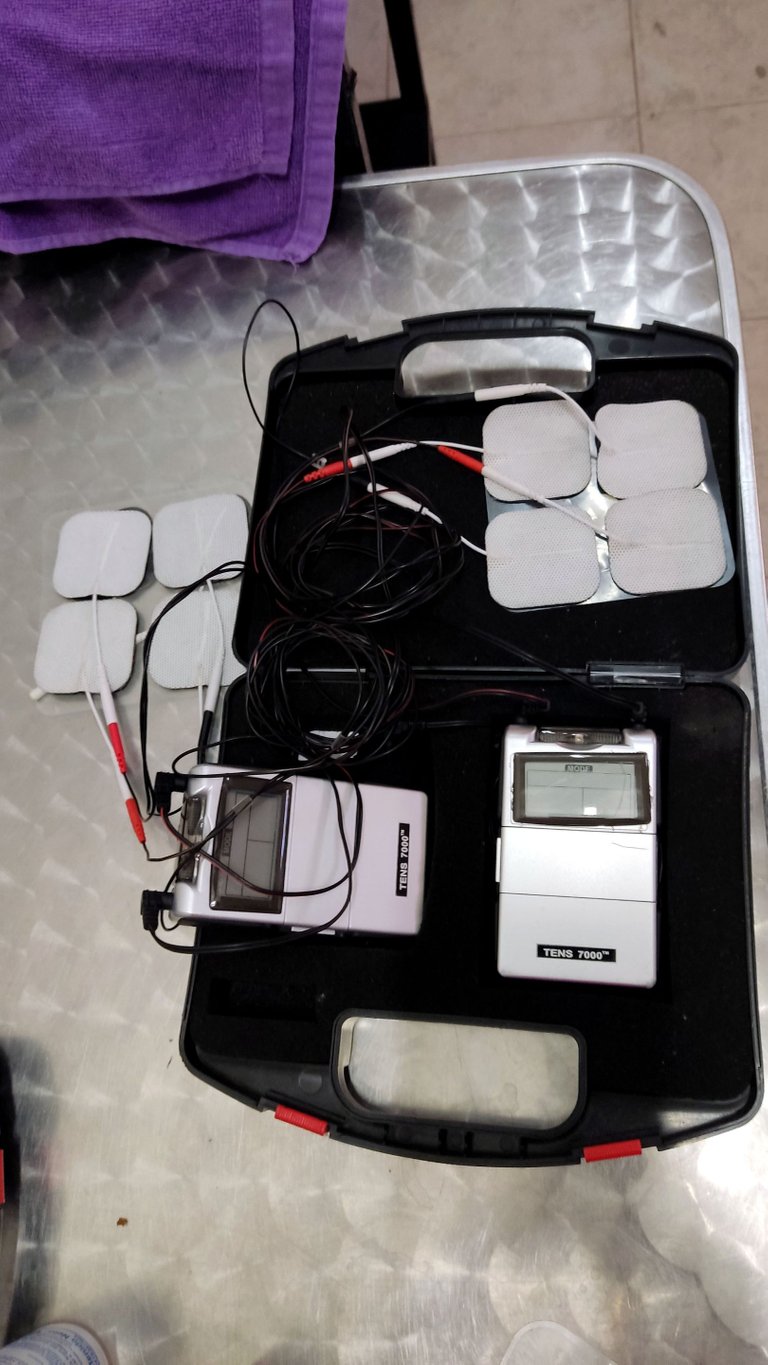
El Electroestimulador
se utiliza a través de electrodos que se adhieren al cuerpo y se colocan en diferentes puntos del mismo, funcionan con baterías, generando corriente.
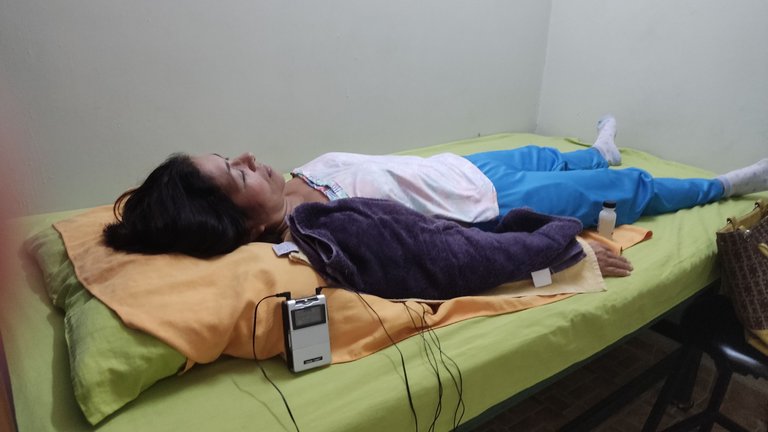
Junto con el tratamiento de electroestimulación me colocan compresas calientes, tanto en la zona de la espalda como del brazo, también tienen compresas frías dependiendo de las necesidades del paciente.
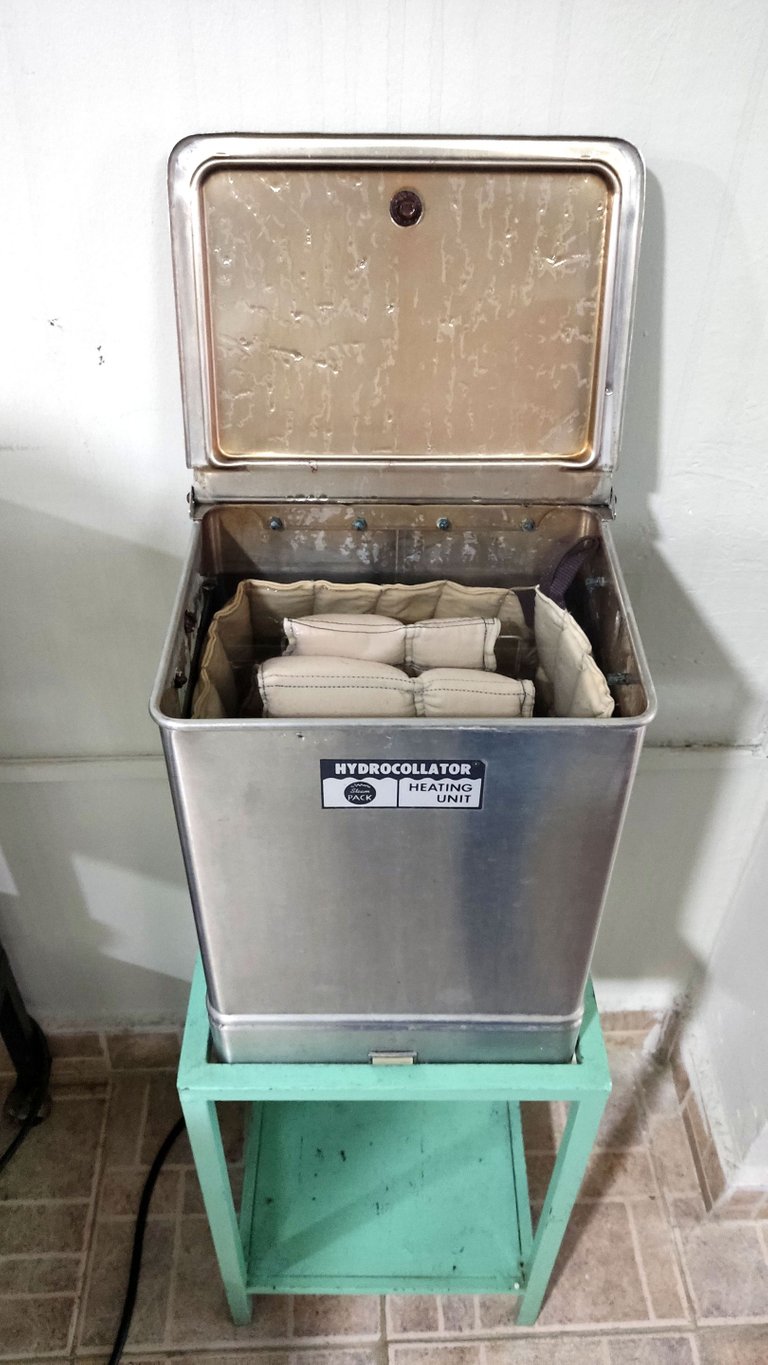
Tanque para Compresas Calientes.
La sala de rehabilitación también cuenta con un compresor de termoterapia que mantiene la temperatura ideal para las compresas. Me gusta especialmente porque relaja los músculos y las compresas se mantienen calientes por un tiempo aproximado de 10 a 20 minutos.
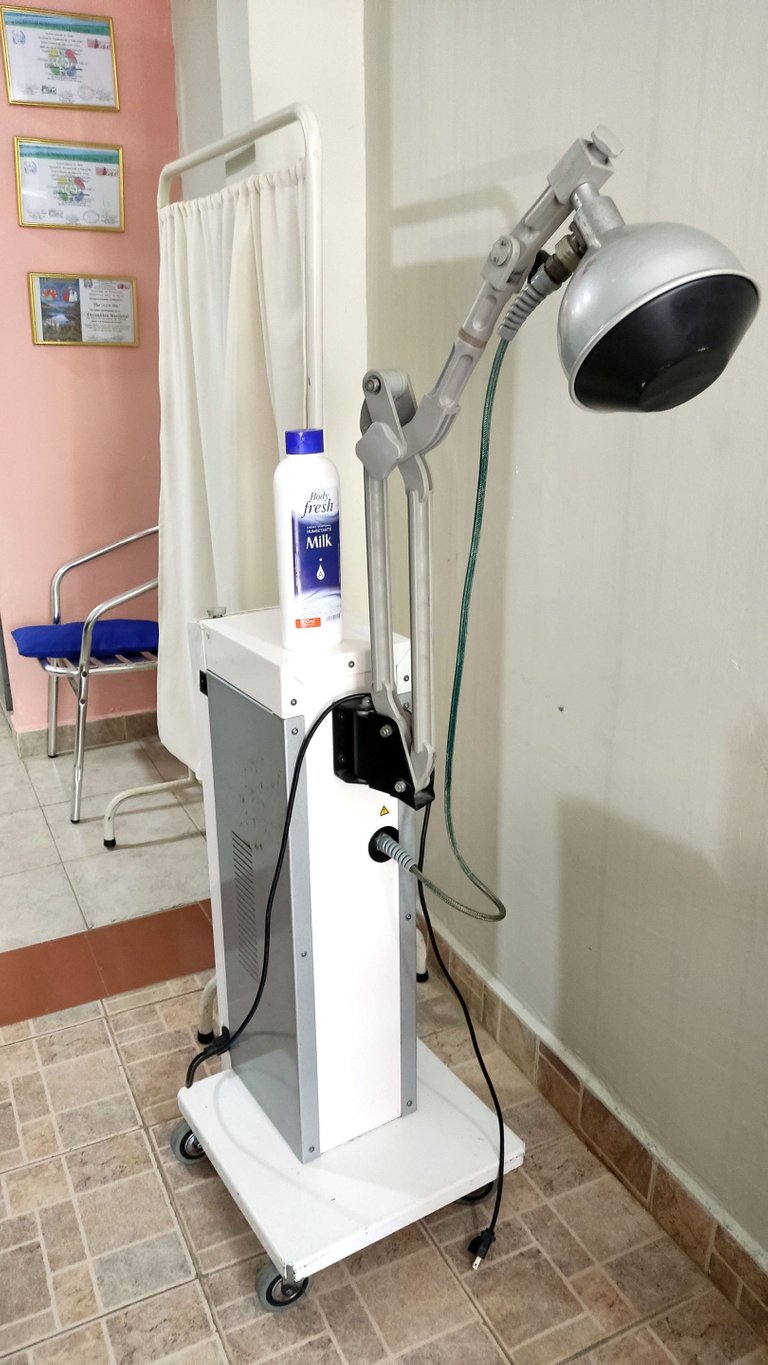
Microondas.
Equipo que emite ondas de muy bajo espectro y que se caracteriza por generar calor entre las células al experimentar una vibración microscópica cuando se expone a este tipo de trabajo. Es especialmente útil cuando se quiere generar un calor profundo, sobre todo que pueda llegar más allá de lo que se puede conseguir con el calor superficial (compresas calientes)
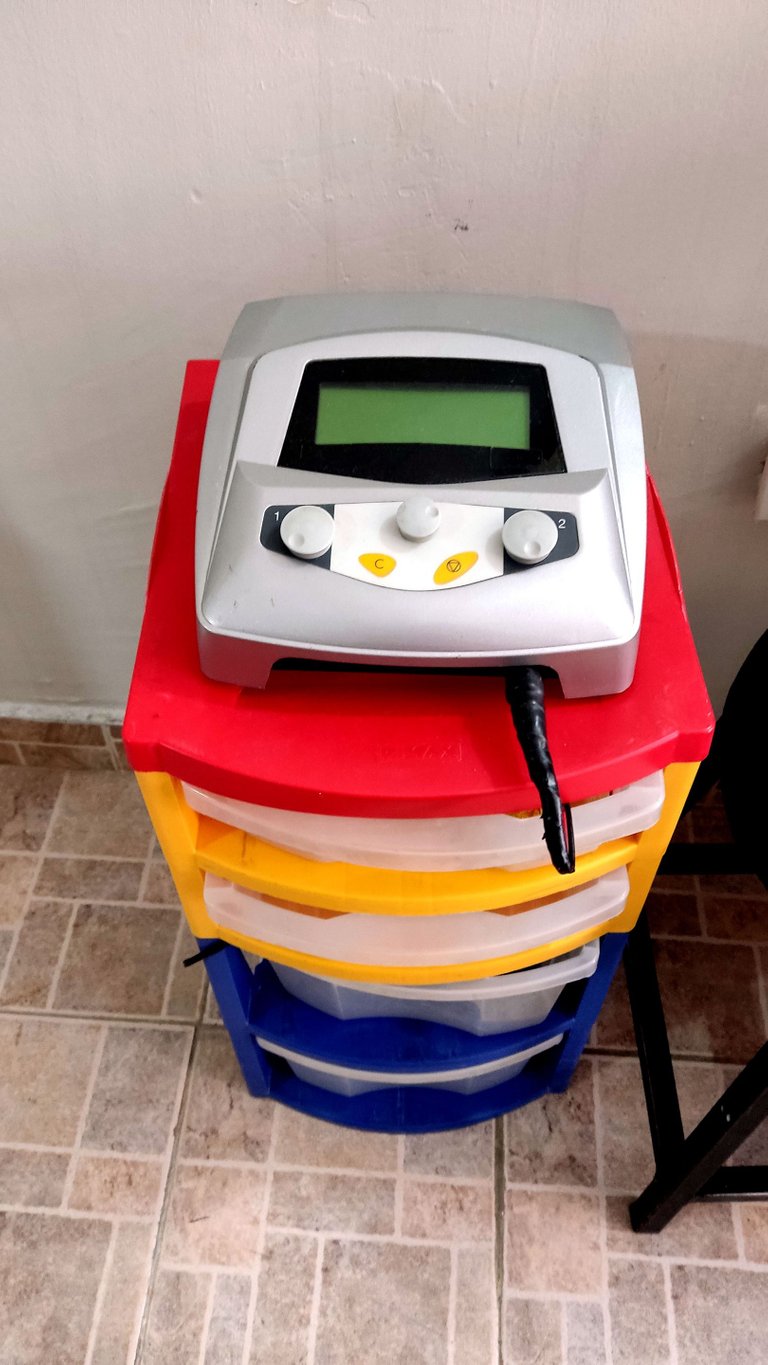
Ultrasonido.
Equipo electrónico que se basa en la emisión de sonido a muy alta frecuencia y que genera varios efectos sobre los tejidos sobre los que se aplica, siendo el principal la llamada cavitación, que consiste en una microvibración de las células y tejidos expuestos, consiguiendo así varios efectos, como el aumento de la circulación local y de la actividad celular, pero sobre todo, este efecto permite que aquellas superficies articulares que tienen un ligero desgaste, experimenten un pulido de esta superficie, mejorando así la superficie articular.
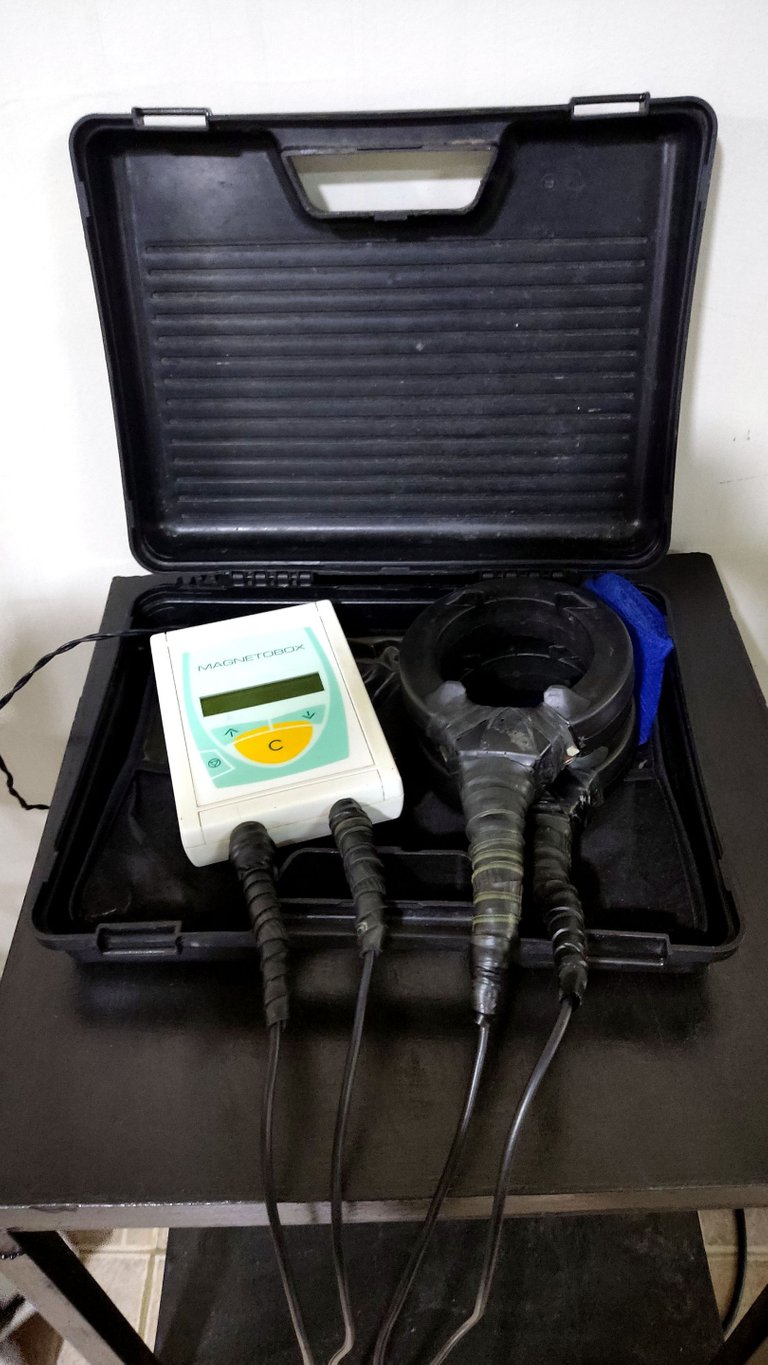
Magnetoterapia.
Como su nombre indica, este agente físico se basa en la emisión de campos electromagnéticos en la zona donde se aplica. Se ha demostrado científicamente que estas emisiones magnéticas sobre los tejidos influyen en las cargas eléctricas de nuestro cuerpo pudiendo comprobar que estas emisiones aumentan significativamente la actividad celular. Su aplicación en fracturas y otras lesiones de tejidos blandos es de suma importancia debido a su efecto de aceleración del proceso de reparación celular.
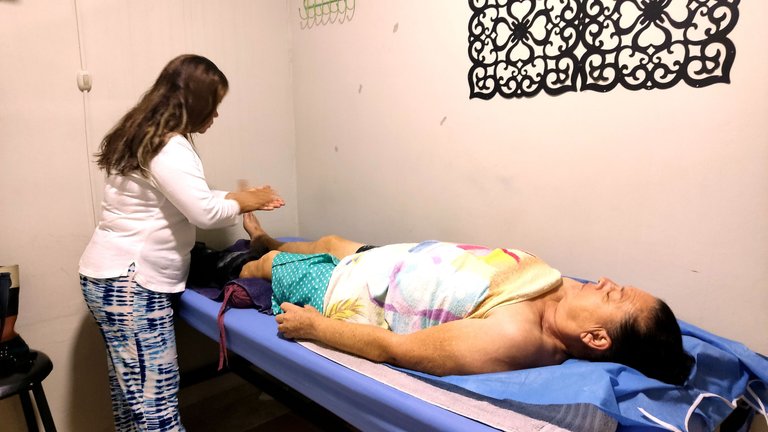
Después de utilizar la electroterapia, pasamos a los masajes que nos permitirán continuar con el tratamiento fisioterapéutico para restaurar las zonas comprometidas, facilitando así su recuperación.
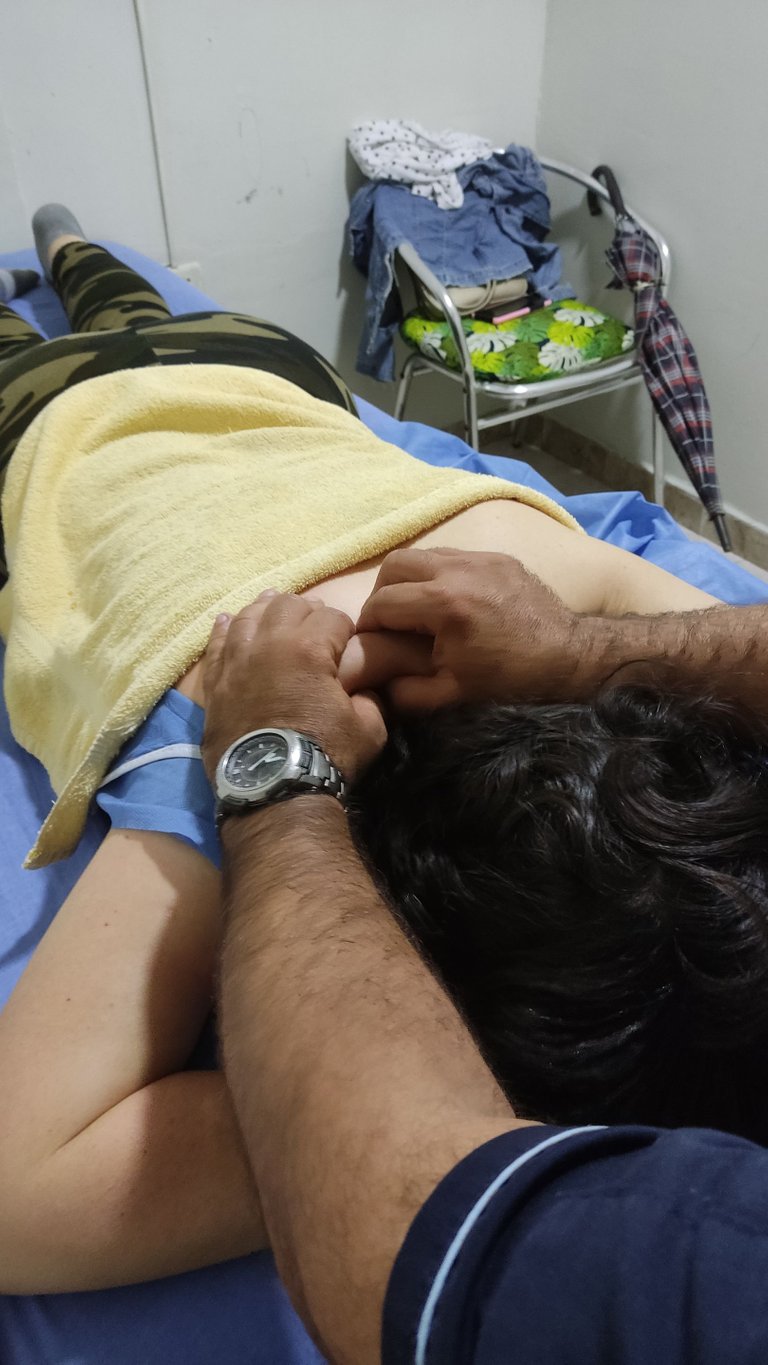
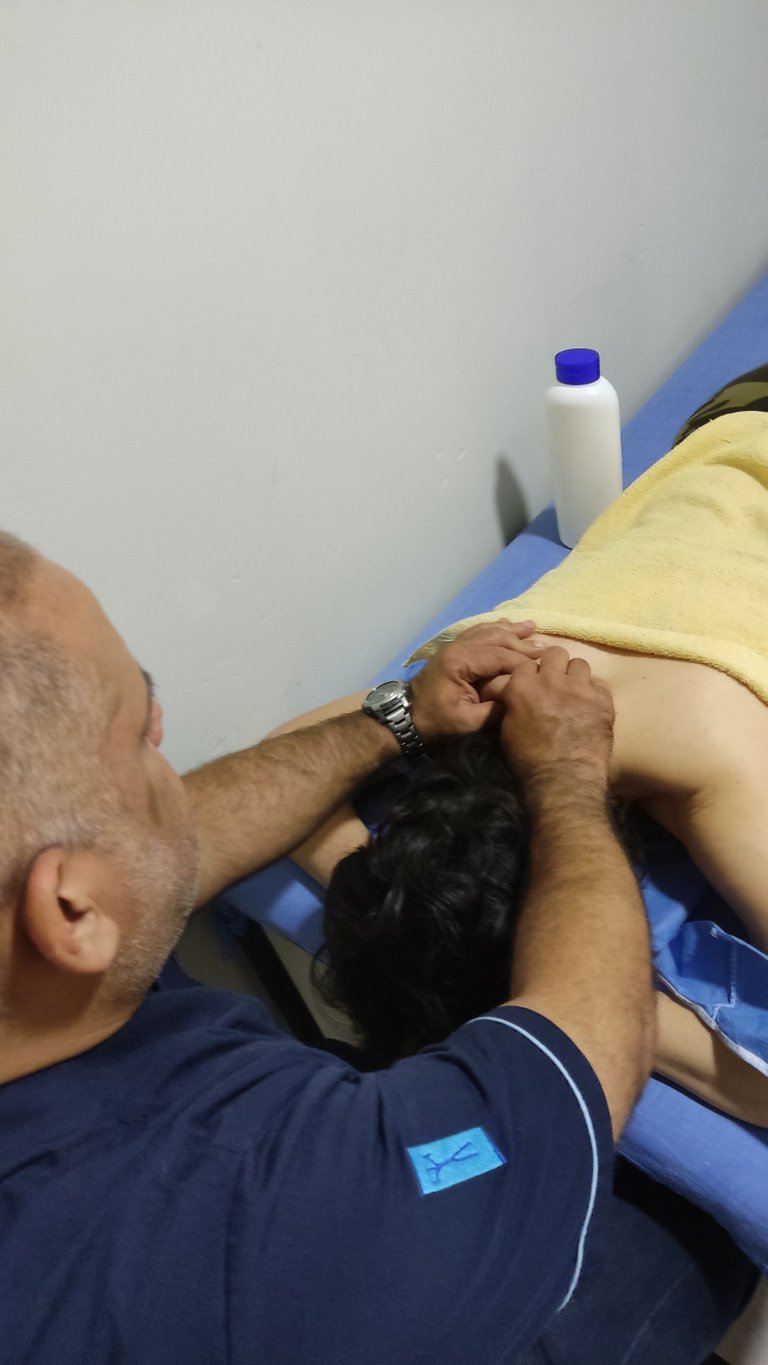
Terapia Manual.
Terapia basada en técnicas manuales y que tratan muy especialmente a las afecciones derivadas tanto de los músculos como de la membrana que los recubre conocida como "Fascia , siendo en muchos casos responsables de síntomas dolorosos en diferentes partes del cuerpo, así como de la limitación de los movimientos articulares.
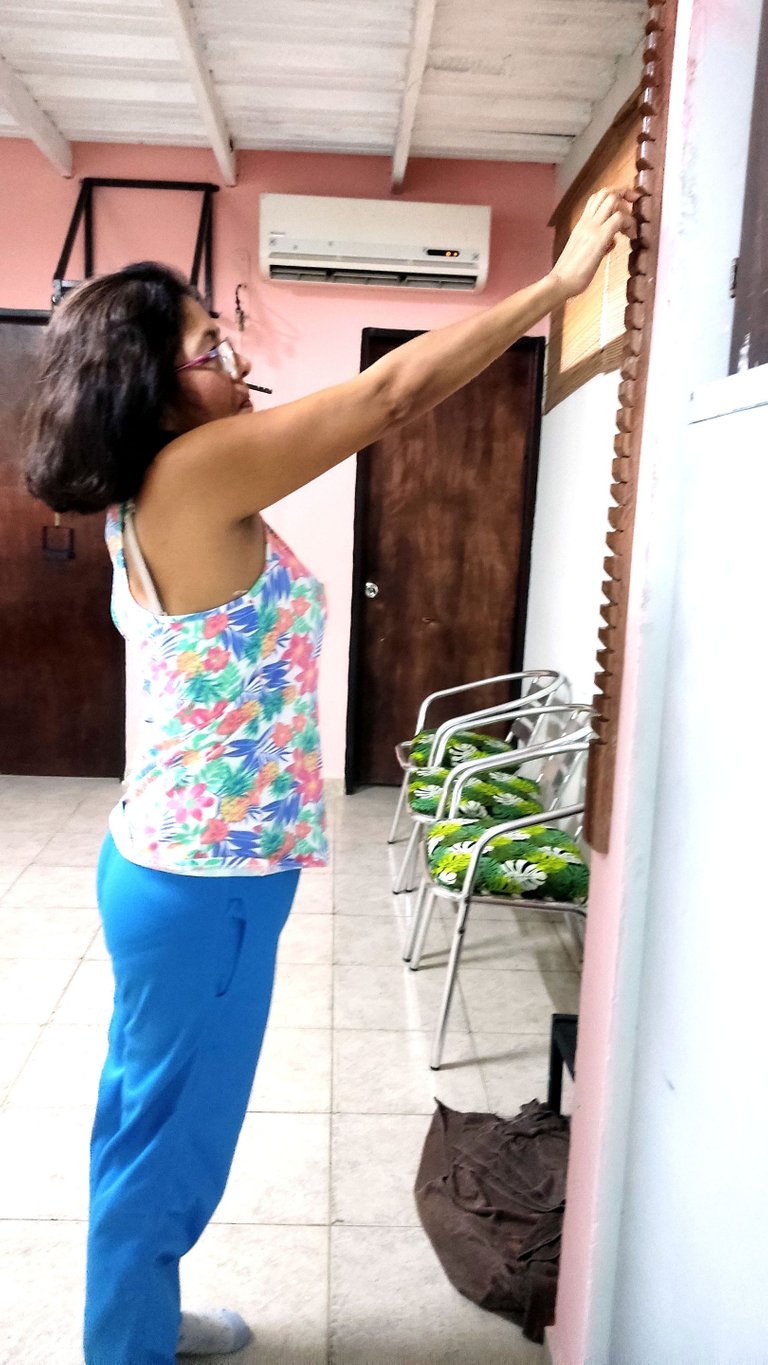
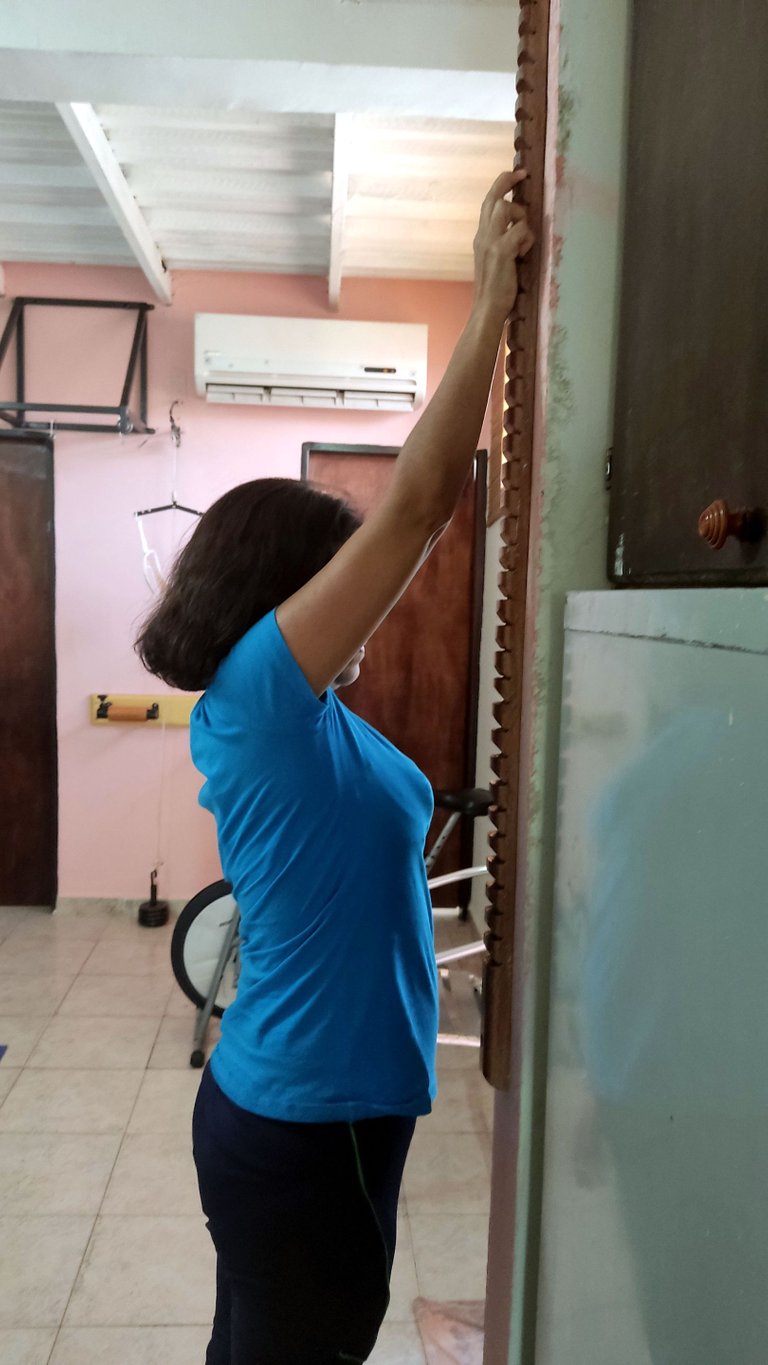
Al finalizar la electroterapia y después de los masajes estamos preparados para el ejercicio físico, que también es muy importante, ya que medirá el nivel en el que nos encontramos y aprovecharemos todos los estímulos que hemos recibido para poder recuperar nuestros movimientos naturales.
Esta barra para subir con los dedos es uno de los ejercicios que se realizan para los brazos.
Contamos y vemos hasta dónde subimos para que cada día nos marquemos el objetivo de llegar a nuestra máxima altura, que fijamos con el otro brazo.
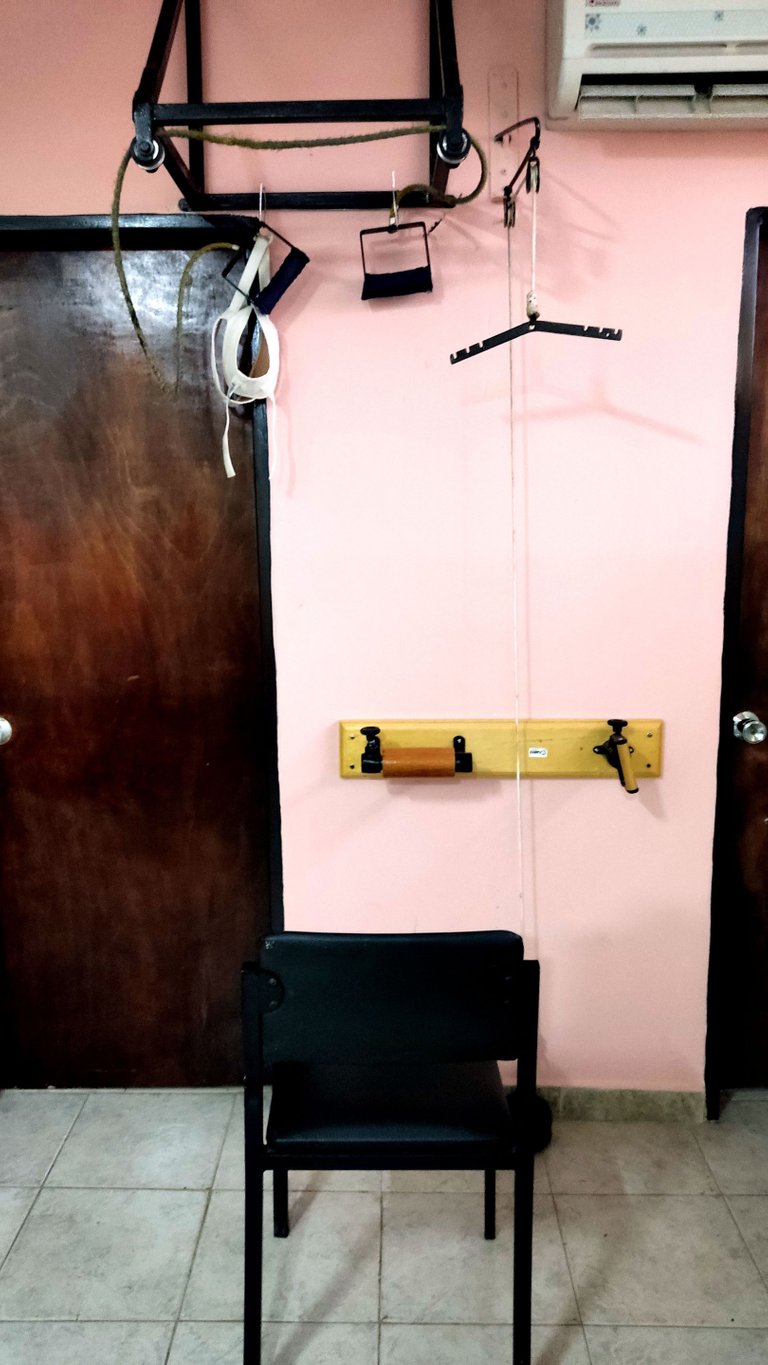
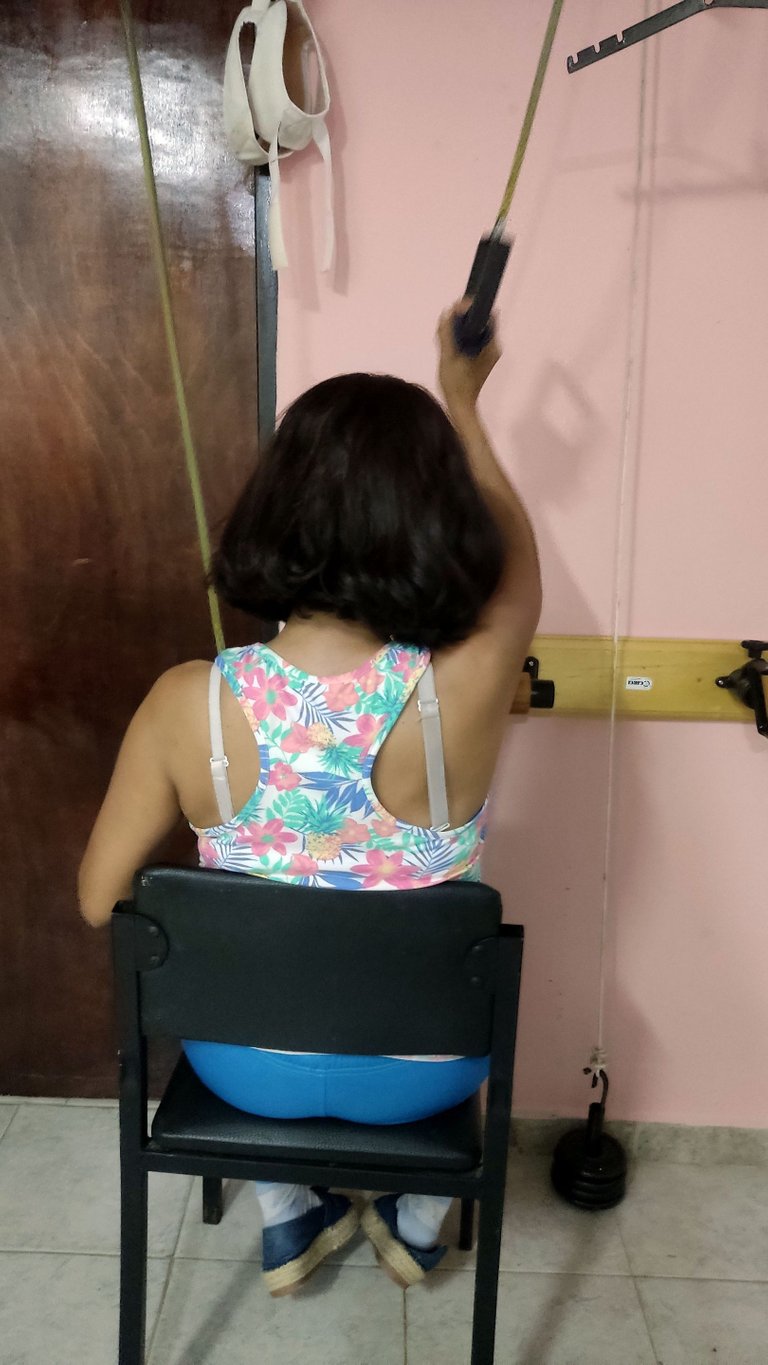
También hay poleas con las que realizamos la terapia de poleas que permite la movilización del brazo de forma fácil, utilizando nuestra propia fuerza, por lo que es ajustable y medible.
En esta zona también se realizan diferentes ejercicios con pesas, palos y pelotas según indique el fisioterapeuta.
El fisioterapeuta también mandará ejercicios para practicar en casa, que ayudarán a la rehabilitación total de la zona afectada.
Infinitas gracias por la ayuda que he recibido de estos maravillosos fisioterapeutas, es una gran labor que nos apoya en estos casos, donde tenemos incertidumbres sobre la recuperación y solo con este tipo de cuidados, no solo de manos de profesionales en su campo, si no de gran calidad humana, hace más fácil pasar por este tipo de experiencias.
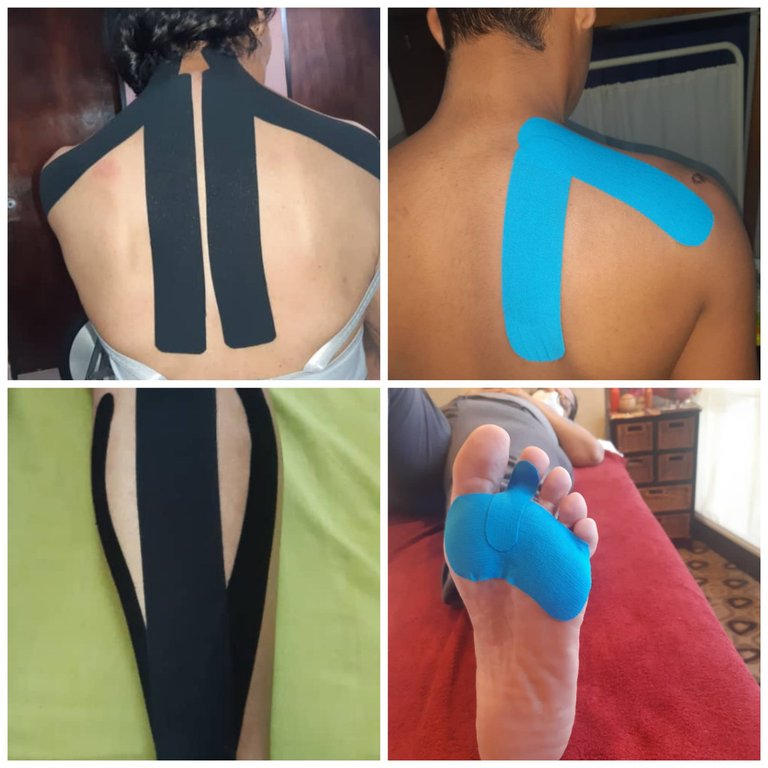
El kinesioTaping
Es una técnica alternativa para tratar las lesiones musculares y tendinosas. Consiste en utilizar una banda elástica autoadhesiva al cuerpo humano y que al aplicarla sobre la zona ejerce cierta presión sobre los tejidos subcutáneos, es decir, los tejidos que se encuentran a nivel dérmico, hipodérmico, incluyendo las membranas que recubren los músculos y el propio músculo.
El principio terapéutico fundamental del kinesiotaping es que la banda elástica externa que se coloca en la zona de cierto apoyo o estabilidad al músculo que está lesionado, ayudándole a ejercer su función de contracción y relajación.
El músculo en su momento de contracción, dilatación y relajación tiene esa ayuda externa y las personas no sienten ni el dolor ni la inestabilidad que sentían antes de la aplicación de la banda elástica.
El kinesiotaping es muy adecuado para lesiones en deportistas que tienen un alto nivel de rendimiento y exigencia y necesitan mantener su nivel incluso en circunstancias en las que deberían descansar.
El kinesiotaping se utiliza para solucionar una deficiencia muscular muy concreta, pero la forma ideal de que el músculo alcance su nivel óptimo de trabajo es a través del ejercicio físico.
Espero que esta información haya sido útil y sobre todo contribuya a prevenir, cuidar y mantener nuestro aparato locomotor para disfrutar de una vida llena de libertad de movimiento y flexibilidad.
Gracias por leer.

- Fotos tomadas por @aldara desde su telefonoRedmi.
- Traduccion realizada con Deepl .
- Imágenes editadas con photoshop
English version
Greetings dear community.
Introduction
After a few months of absence due to an ailment caused by an injury to the rotator cuff area, I want to share with you how this rehabilitation process has been and how I have learned more about this wonderful machine we call body.
Something that I learned very important is that we must know what are the mechanisms that our body has, especially our muscles, ligaments and tendons to an injury.
Which are the cares that we must have to avoid injuries, postures, movements, how we must execute them correctly to avoid damages.
After practicing hiking using a cane to advance on the path, due to the misuse and abuse of that cane, I got a strong inflammation in the rotator cuff area.

Rotator Cuff-Treatment
The rotator cuff is made up of several muscles and tendons such as the Supraspinatus, Subscapularis, Lesser Round and Infraespinatus.
This set of muscles makes possible all the movements we do with our arms, rotations, elevations, flexions, with this experience I understood that our body will always protect us as a defense mechanism, pain and inflammation to prevent movement.
It is very important to know the measures to take in these cases to avoid prolonging the pain and inflammation, in my case I did not pay much attention, and although I put cold and heat to deflate it was not enough or the most appropriate way to help the recovery of this area.
That is why I sought the help of specialists in the field as is the case of my friends Daiana Jugo and Nestor Lopez, excellent physiotherapists with over 20 years of experience, and offer their services in the city where I currently live Barinas, Venezuela.
I will share with you the equipment, technology and devices that are currently used in this rehabilitation center and that have really been of great help and that I have been able to see the advances and improvements in this affected area.

My friend Daiana is a wonderful being, sweet and loving, who makes therapies a moment in which you can transcend the pain and turn it into sweetness.
This type of injury requires patience and perseverance to gradually recover the natural tone and mobility of the affected area. It is very important the accompaniment of a good physiotherapist who manages both physical and emotional aspects to achieve the goal.

Electrotherapy
We began the sessions with electrotherapy, which the physiotherapist explained to me basically has three types of uses. As an analgesic, for muscle strengthening and to improve circulation. For each function a different type of wave is used.

The Electro Etimulator
Is used through electrodes that are attached to the body and placed in different points of the body, they work with batteries, generating current.

Along with the electrostimulation treatment I was given hot compresses, both in the back and arm area, they also have cold compresses depending on the patient's needs.

Tank for Hot Compresses.
The rehabilitation room also has a thermotherapy compressor that maintains the ideal temperature for the compresses. I especially like it because it relaxes the muscles and the compresses stay warm for approximately 10 to 20 minutes.

Microodes.
Equipment that emits waves of very low spectrum and that is characterized by generating heat between the cells by experiencing microscopic vibration when exposed to this type of work. It is especially useful when you want to generate deep heat, especially that can reach beyond what can be achieved with surface heat (hot compresses)

Ultra sound.
Electronic equipment that is based on the emission of sound at very high frequency and that generates several effects on the tissues on which it is applied, the main one being the so-called cavitation, which consists of a micro vibration of the cells and tissues exposed, thus achieving several effects, such as increased local circulation and cellular activity, but above all, this effect allows those joint surfaces that have a slight wear, experience a polishing of this surface, thus improving the articular surface.

Magnetotherapy.
As its name indicates, this physical agent is based on the emission of electromagnetic fields in the area where it is applied. It has been scientifically proven that these magnetic emissions on the tissues influence the electrical charges of our body being able to prove that these emissions significantly increase cellular activity. Its application on fractures and other soft tissue injuries is of utmost importance due to its effect of accelerating the cellular repair process.

After using electrotherapy, we move on to massages that will allow us to continue with the physiotherapeutic treatment to restore the areas that are compromised, thus facilitating their recovery.


Manual Therapy.
Therapy based on manual techniques and that treat very especially to the affections derived from both muscles and we have the membrane that covers them known as "Fascia , being in many cases responsible for painful symptoms in different parts of the body,as well as limitation of joint movements.


At the end of the electrotherapy and after the massages we are ready for the physical exercise, which is also very important, since it will measure the level in which we are and we will take advantage of all the stimuli we have received to recover our natural movements.
This bar to climb with the fingers is one of the exercises that are performed for the arms.
We count and see how far we climb so that every day we set ourselves the goal of reaching our maximum height, which we set with the other arm.


There are also pulleys with which we perform the pulley therapy that allows the mobilization of the arm in an easy way, using our own strength, so it is adjustable and measurable.
In this area we also perform different exercises with weights, sticks and balls as indicated by the physiotherapist.
The physiotherapist will also send exercises to practice at home, which will help the total rehabilitation of the affected area.
Infinite thanks for the help I have received from these wonderful physiotherapists, it is a great work that supports us in these cases, where we have uncertainties about the recovery and only with this kind of care, not only from the hands of professionals in their field, if not of great human quality, makes it easier to go through this kind of experiences.

KinesioTaping
Is an alternative technique to treat muscle and tendon injuries. It consists of using a self-adhesive elastic band to the human body and that when applied on the area exerts some pressure on the subcutaneous tissues, ie the tissues that are at the dermal level, hypodermic, including the membranes that cover the muscles and the muscle itself.
The fundamental therapeutic principle of kinesiotaping is that the external elastic band that is placed on the area of certain support or stability to the muscle that is injured, helping it to exercise its function of contraction and relaxation.
The muscle in its moment of contraction, dilation and relaxation has that external assistance and people do not feel neither the pain nor the instability that they felt before the application of the elastic band.
Kinesiotaping is quite suitable for injuries in athletes who have a high level of performance and demand and need to maintain their level even in circumstances where they should be resting.
Kinesio taping is used to solve a very specific muscular deficiency but the ideal way for the muscle to reach its optimal level of work is through physical exercise.
I hope this information has been useful and above all contribute to prevent, care and maintain our locomotor system to enjoy a life full of freedom of movement and flexibility.
Thanks for reading.

- Photos taken by @aldara from her Redmi phone.
- Translation made with Deepl
- Images edited with photoshop
Buenas. Su post ha sido propuesto para ser votado a lo largo del día por el witness @cervantes. Un saludo